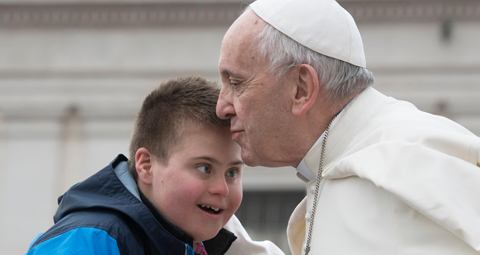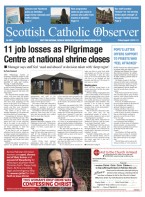BY Peter Diamond | August 3 2018 | ![]() 0 COMMENTS
0 COMMENTS ![]() print
print

Society must ‘start valuing those with Down’s syndrome’
Publication Date: 2018-08-03
Church joins Catholic mothers in call for discussion on human rights of disabled
Catholic mothers have said it is ‘time for society to start valuing people with Down’s syndrome’ following an international congress held in Glasgow last week.
The global World Down’s Syndrome Congress was held in Scotland for the first time from July 23 to 28.
More than 1,000 families, healthcare professionals, and researchers were at the Glasgow event, taking part in sessions on social inclusion and communication.
Two Catholic mothers have now called for a debate on how Scotland treats those with Down’s syndrome, and their call has been backed by Bishop Stephen Robson of Dunkeld Diocese, who said ‘society needs to start appreciating’ those with the condition.
Lynn Murray has an 18-year-old daughter with Down’s syndrome, who greeted people at the opening ceremony of the congress on behalf of Down’s Syndrome Scotland.
“I would say it was a very successful event which promoted the amazing contribution and potential these people make to our country,” Mrs Murray said. “It was so friendly with over 1,000 people attending.”
Mrs Murray said that the government needs to ‘address the public policy around Down’s syndrome’ and that while support from the First Minister Nicola Sturgeon, who praised the conference, was welcome, ‘actions speak louder than words.’
Mrs Murray compared current attitudes to Down’s syndrome to the way society previously viewed autism, arguing that those with that condition were at one time written off. “But over time we have grown to realise that they are highly-functioning individuals who have untapped potential and now society is beginning to value them.
“It’s now time for society to start valuing people with Down’s syndrome because they too are an untapped group.”
Screening
Angela Mui, a parishioner of Glasgow University’s Turnbull Hall, is a mum of two sons, the youngest of who, four-year-old Stephen, has Down’s syndrome.
She attended the congress on Wednesday and Thursday and said that it was wonderful to see so many people from around the world with the same condition as her son.
She said there were many positives to take from the conference, including on how people with Down’s syndrome are ‘thriving within society as they learn, live and adapt.’
“However, what kept coming into my head was the fact that most people out there in society do not realise that babies who have been identified with Down’s syndrome prior to being born can be aborted up until birth,” she said. “Our government is opposed to supporting these people and yet they have so much to give to society.
“I find it very sad that my son is going to grow up in a country where he will have very few if any friends who also suffer from Down’s syndrome and experience the same condition.”
Although abortions in the UK are limited to a 24-week term limit, abortions up until birth are legal if there is a significant risk the child will be born with a severe disability.
In recent years, advanced screening for disabilities in unborn children has seen some countries move to a 99 per cent abortion rate for Down’s syndrome pregnancies.
Bishop’s support
Bishop Stephen Robson said we ‘should start to appreciate people who have Down’s syndrome because when we encounter them they bring out gifts of love within us that we never knew we had.’
“I love meeting them because they are tremendously loving people,” he said. “They can be very intelligent people too. I knew a child who became an altar server aged seven. I remember his parents being worried when he was going to high school but he thrived. He later went on to gain a first class degree at university so there is a wide spectrum of people with Down’s syndrome and it’s certainly not always a barrier.
Bishop Robson added: “But we must remember how incredibly vulnerable they are. What’s very sad is the amount of pressure put on parents to abort their baby when they find out that the child has the condition.
“Having a child with Down’s syndrome is nothing to be ashamed of because they are capable of so much love and they provide families with so much joy. I do realise that it can be hard for parents but that is why we need to support them.”
Lynn Murray, spokeswoman for the campaign Don’t Screen Us Out, said that women decide to have an abortion in 90 per cent of cases when they are told their unborn child has Down’s syndrome.
“This is primarily because it’s the only option presented to them when they are told,” she said. “We don’t believe that there is neutral stance from health professionals and this has to change. We need to start talking about the human rights of people with Down’s syndrome because clearly society is undervaluing their place.
“We need a public policy which gives a neutral stance and informs prospective parents properly about the paths you will incur as a Down’s syndrome parent.”
Last month, the British Medical Association (BMA) urged the UK Government to launch a full consultation on the Down’s syndrome screening test. The Christian Institute has also cautioned that screening ‘has its roots in the idea that some people’s lives have no value.’
Michael Robinson, communications director of pro-life charity SPUC Scotland, said: “In Scotland, we rightly go to great lengths to accommodate people with a disability, yet as a society we are eradicating them before they are born, thus sending a bleak message to our disability community.”
Held every two years in venues across the world since the 1990s, the World Down’s Syndrome Congress brings together a global community of people affected by Down’s syndrome.
Speaking in parliament, prior to the congress, the First Minister said: “The congress is an opportunity for us to celebrate the amazing contribution that individuals with Down’s syndrome make to our society. We should and we do value them and this is an opportunity for us to say that loudly and clearly.”










